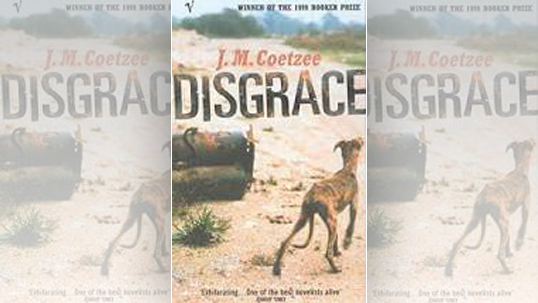Author: J.M. Coetzee

Learn from Pain or Ignore It: A Book Review on J.M. Coetzee’s Disgrace
I, like many children before, believed in the misconception that teachers lived in schools. Teachers’ personal lives were inseparable from their educational vocation. It is until we mature and view teachers as more than mere instructors, that we realize the nonsensicalness of the previous notion. Yet, teachers cannot escape being placed on a pedestal given their position of authority, which increases in esteem depending on the level of education. Perhaps that is why when someone in the teaching profession falls from grace, stark distinctions are made between right and wrong. This sentiment ignites the flames of J.M. Coetzee’s novel, Disgrace, but no one was prepared for how beautiful or destructive it would prove to be.
The novel follows the protagonist, David Lurie, who is a 52-year-old professor at Cape Technical University. “Passionate” is not a word Lurie’s students would use to describe him “[b]ecause he has no respect for the material he teaches, he makes no impression on his students,” (Coetzee, 4). Instead, Lurie is estranged from his students, as well as to the reader, largely due to his vanity and sexual appetite. Shamefully (or admirably?), Lurie is aware of his actions but continues to live a life pursuing his desires while under the guise of an educator. This raises the question, what does it mean to be an educated person? If it implies to be sophisticated, righteous, and intelligent, then Lurie is simultaneously all of that and none of it. Inevitably, Lurie is caught having an affair with a student, resulting in him starting life anew.
It would be easy to hate the obvious. It would be easy to dislike Lurie. It is not easy to understand him. During his retreat, he resides with his lesbian daughter Lucy. Lurie’s new life is a journey of reflection, a journey of understanding his place in a new world and old. Yet, “[t]he more things change the more they remain the same. History repeating itself (...) Perhaps history has learned a lesson,” (60). Education is not a clear, neat, or structured process. Still, there is a strong inclination to retain rigidity, especially towards one’s own understandings. In this light, if we were to understand disgrace as shame, dishonour, and unworthiness, then we would understand its positive counterparts of grace. There is a preference for one over the other, but why can’t we accept both? Amidst David’s journey, he is a victim of what he has been taught and from what he has taught himself.
Moreover, the ability to empathize is pushed to its limits during a reading of Disgrace. For Coetzee empathy is more than understanding and relating to people you care about or see yourself in. Empathy in this novel forces one to attempt to understand actions, decisions, and people with whom you may share no semblance to, and even hate. This is front and center when three men assault Lurie and Lucy at their home, they must endure the effects of the aftermath. Without revealing the gravity of the situation, it is an understatement to say that their lives were forever changed. “Count yourself lucky” (95) are the most comforting and heartbreaking words to help endure the trauma. But it also serves as a mantra that offers new possibilities.
At its core, Disgrace is a novel of education in both a formal and informal manner. It is laden with more failures than triumphant narratives. Cliches such as “what doesn’t kill you, makes you stronger” or “you learn from your mistakes” are made absurd. Amidst these hardships does Lurie learn anything? Does Lucy? Does the reader? We can make the most (or least) of any situation, but the process is closely tied to self-delusion. We get “used to things getting harder; one ceases to be surprised that what used to be as hard as hard can be grows harder yet” (214). We make sense of all that we experience. We dictate what is and isn’t. Perhaps the promise of a beautiful life must be upheld with a more beautiful lie.
Coetzee’s prose masters simplicity and powerful imagery, which not only grips the reader’s attention but also transports them into the experience. The pain a character endures becomes the lump in the reader’s throat. Underlying themes such as racism, sexuality, gender, power, desire all lay below the surface of the text, which parallels the way it is enacted in real life. Always present but you are not aware of it until it hits you straight in the face. Little is definitive in the novel. There are many ambiguities across actions, decisions, and thoughts. Perhaps, it is during these perplexing moments that offer the most valuable lessons.
The review goes here
